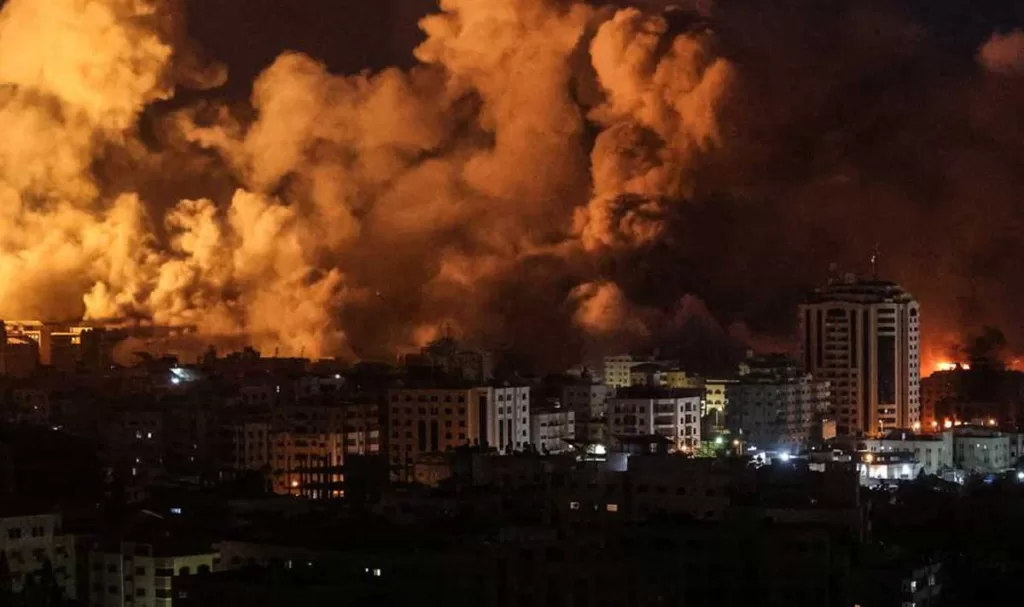The Middle East is slowly entering a phase of regional war after Israel has started its ground invasion to Lebanon and hundreds of ballistic missiles were fired from Iran to the Jewish state. There are reports of Israel planning to target Iran’s nuclear facilities and oil fields as a retaliation with the help of the US. Houthis, a proxy group of Iran operating in Yemen, has also shot long range missiles at Israel. Any further escalation in the region will adversely affect the oil pricing and will have serious repercussions on the world economy. Even though not directly involved, India is closely observing the developments in the region. India is one of the very few nations having friendly relations with both Israel and Iran. Therefore, it is important to understand the impact of the current Israel-Iran situation on India and how it affects India’s lost standing policy of ‘dehyphenation’.
Following the deadly October 7 attacks by the Hamas militants (another proxy group of Iran) on Israel, the Jewish state invaded the Gaza strip and carried out major operations. The Israel Defence Force (IDF) was successful in eliminating the top rank and files of Hamas including its head Ismail Haniyeh. The head of Iran’s Lebanese proxy Hezbollah, Hassan Nasrallah was eliminated following the IDF’s precision strike on the headquarters of Hezbollah at Beirut. Currently, Israel is in visible military conflict with Iran’s proxies at three different nations,i.e, Gaza, Yemen and Lebanon. Israel’s Prime Minister Benjamin Netanyahu, while addressing the general address of the United Nations held two placards with the world map. One he called the ‘curse path’ and the other as the ‘blessing path’. According to him, the ‘curse path’ included Lebanon, Syria, Iraq, Yemen and Iran while the ‘blessing path’ included Sudan, Egypt, Saudi Arabia, UAE and India.
Both Iran and Israel are important players in India’s larger geopolitical aspirations. Iran is heavily sanctioned by the US and it is depending heavily on the Chinese to purchase its oil. As per the latest data, China purchases around 90% of the oil produced in Iran. The increased hostility with the US has pushed Iran to the Sino – Russian axis which keeps India at a position of disadvantage. Iran is India’s gateway to Central Asia and an important regional partner to keep Pakistan at bay. India has invested heavily in the Chabahar port located in Iran, which is seen as an important countermeasure against the Gwadar port in Pakistan. The Gwadar port is an important constituent of the China Pakistan Economic Corridor (CPEC), which is a part of China’s ambitious Belt Road Initiative (BRI). A trilateral agreement was signed between India, Iran and Afghanistan to give Indian goods, heading for Afghanistan and Central Asia, preferential treatment and tariff reductions at Chabahar port.
The Indo – Israeli relations grew exponentially after 1992, when India finally established full diplomatic relations with the Jewish state. Israel provided India with arms and ammunition during the Kargil war in 1999 against Pakistan. This supply was vital to the Indian army since only a few nations agreed to assist India during the war. By 2019, India became Israel’s third-largest Asian trade partner and tenth-largest overall trade partner. The bilateral trade excluding military sales was at around US$ 6.3 billion. As of 2022, India is Israel’s largest client for military equipment sales, and Israel is India’s fourth-largest supplier of military equipment after Russia, France and US. The figures suggest that around 42% of all Israeli arms exports are received by India. Even though the relations with Israel have strengthened over years, India has always maintained its initial stand of two-nation policy of the Palestine-Israel conflict, emphasising its dehyphenation policy.
The current escalations in West Asia have put Indian interest at risk to a larger extent. The strengthening China-Russia-Iran nexus poses a greater challenge to India. Russia is already using Iran made Shaheen drones in its war against Israel. During its raids in Hezbollah underground tunnels inside the Lebanese territory, the IDF found Russian made missiles and military equipment. There are reports of Israel’s air force striking targets near Russia’s Hmeimim Air Base in Syria which could eventually result in further escalations. The hostilities between the western forces and Russia have only increased, after Ukraine made advances deep inside Russian territory. The Russian President Vladimir Putin has already warned Israel to withdraw from the Lebanese territory and even condemned the killing of Hezbollah Chief Hassan Nasrallah.
It is evident from the Indian response to the ongoing crisis that India is seriously trying to balance between Israel and Iran. While both the Indian President and Prime Minister wished the Jewish community and Israel on the occasion of Rosh Hashanah (Jewish New Year), simultaneously, the Indian navy was engaged in maritime drill with the Iranian warships. India had a similar approach to the Russian – Ukraine conflict too. Prime Minister Narendra Modi after meeting Ukraine President Alexander Zelensky had sent India’s National Security Advisor Ajith Doval to brief the Russian President about his meeting with Zelensky. India by no means wants to send a message to the Arab world that they are in any way inching towards Israel. Any such signal will have negative consequences on India. But at the same time, it is very much evident that a huge percentage of the Indian population are sympathetic to the Jewish state. This is something that the government cannot ignore.
India has a strong 8 million diaspora in the Western Asian region. Any further escalations could affect the Indians in the region. After Israel threatened to attack the oil fields of Iran, the price of crude oil shot up. As a large-scale import of crude, any substantial increase in the oil price will hit the Indian economy. The current conflict between Iran and Israel escalating into a regional war and new players entering the battlefield threatens the Indian interest in the region. Therefore, it is important to see which direction the war goes from hereon.
